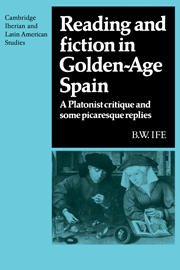1 - Introduction – first premises
Published online by Cambridge University Press: 25 October 2011
Summary
To judge from the frequency with which words like ‘development’ and ‘evolution’ are used in literary studies, one might be forgiven for thinking that books were living beings subject to biological laws. Such words are, of course, insidious in the way that they equate change with improvement. They confuse quality with chronology, and – when we least expect it – they have us thinking in terms of Grand Designs and Historical Goals. The literary output of a group or a period does, however, have a habit of seeming misleadingly purposeful when looked at in retrospect. This danger is particularly acute when we consider the ‘development’ of prose fiction in Golden-Age Spain. The period from the 1490s to the 1650s was one of unequalled literary achievement in Spain. The enormous variety and vitality of the work produced is sufficient indication of the great importance Spanish writers attached to experiment. They tried endless permutations of form, theme and genre, and whenever they exhausted their inherited wealth they went in search of something new. They cudgelled their imaginations to satisfy the demands of a rapidly-growing reading public and in the process they tried and tested genres and formal devices which were eventually to find their way into the main body of European fiction. But the idea of Spain as a proving ground for the novel is as dangerous as it is attractive; it is too tempting to treat the writers of the period as a working party beavering away under the chairmanship of Cervantes in pursuit of the Great Tradition.
- Type
- Chapter
- Information
- Reading and Fiction in Golden-Age SpainA Platonist Critique and Some Picaresque Replies, pp. 1 - 23Publisher: Cambridge University PressPrint publication year: 1985



